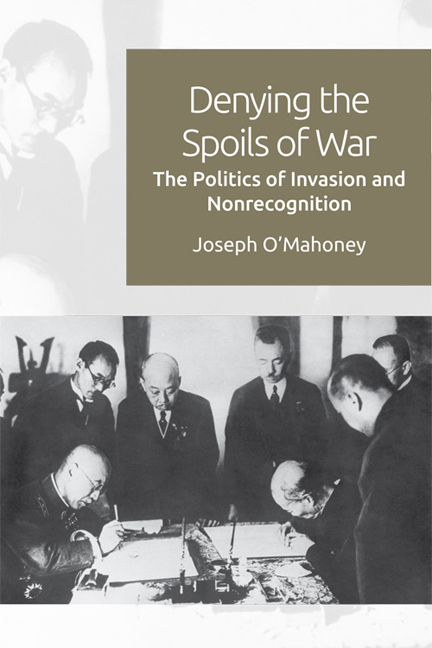Book contents
- Frontmatter
- Contents
- List of Figures and Tables
- Acknowledgements
- List of Acronyms and Abbreviations
- Introduction
- 1 Rule Maintenance: the Logic of Symbolic Sanctions
- 2 The Manchurian Crisis
- 3 The Abyssinian Crisis
- 4 Turkey, Cyprus and the Turkish Republic of Northern Cyprus
- 5 The Independence of Bangladesh
- 6 The Uncertain Fruits of Victory: Variation in Nonrecognition
- Conclusion
- Bibliography
- Index
4 - Turkey, Cyprus and the Turkish Republic of Northern Cyprus
- Frontmatter
- Contents
- List of Figures and Tables
- Acknowledgements
- List of Acronyms and Abbreviations
- Introduction
- 1 Rule Maintenance: the Logic of Symbolic Sanctions
- 2 The Manchurian Crisis
- 3 The Abyssinian Crisis
- 4 Turkey, Cyprus and the Turkish Republic of Northern Cyprus
- 5 The Independence of Bangladesh
- 6 The Uncertain Fruits of Victory: Variation in Nonrecognition
- Conclusion
- Bibliography
- Index
Summary
INTRODUTION
In this chapter, I analyse the crisis surrounding the invasion of Cyprus by Turkey in 1974 and the subsequent nonrecognition of an autonomous Turkish-Cypriot entity. This is a positive case of nonrecognition. There are many similarities between the Turkish invasion of Cyprus and the Japanese invasion of Manchuria. In both, a state used force to occupy a portion of a neighbouing state, and then used its de facto control to support the creation of a new state in that territory. In both, there was initial confusion and uncertainty over whether the use of force was illegitimate. Once the international community, that is, a large number of states, the UN Security Council (UNSC) and UNGA, had decided that the invasion constituted aggression, a violation of the norm of the peaceful resolution of disputes, the results of the invasion were not recognised, even though there were few other sanctions imposed on the norm violator. The Turkish-Cypriots have been in a legal limbo ever since. Nonrecognition clearly has been unsuccessful in overturning the results of Turkeyâs military victory. And yet the UN and every state in the world, except Turkey, persists in this policy. The question is, then, why do they do so? Do they mistakenly see nonrecognition as an effective weapon against norm violators? Are they driven to this ineffective policy by the pursuit of votes at home? As will be shown, these and other alternative explanations for nonrecognition are not well supported in the evidence. Instead, maintaining the illegitimacy of aggression is the crucial justification underpinning the widespread adoption of a nonrecognition policy.
First, I provide a very brief description of the historical context, and the events relevant to the question of nonrecognition. Then I discuss the theoretical implications of the case. This is followed by a detailed analysis of the decision making by the UK, the US and the UN as they are relevant to the adoption of nonrecognition. Of primary interest are the justifications surrounding the adoption of a nonrecognition policy. In this case, arguments against recognising a Turkish-Cypriot state are particularly important as explicit consideration of the issue is usually about deviating from the status quo of nonrecognition.
- Type
- Chapter
- Information
- Denying the Spoils of WarThe Politics of Invasion and Nonrecognition, pp. 111 - 146Publisher: Edinburgh University PressPrint publication year: 2018



